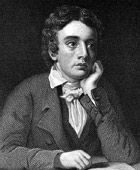JOHN KEATS was born in London, October 29, 1795, and he died of consumption, February 23, 1821, in Rome.
Born in the common walks of life, it was necessary for him to rely upon his own efforts for a support. He was educated at Enfield. Choosing medicine as a profession, he was apprenticed, at the age of fifteen, to a surgeon at Edmonton. Although he spent most of his time in literary study, yet he completed his apprenticeship creditably and repaired to London to complete his work in the hospital.
While an apprentice Keats wrote out a literal translation of Virgil's Eneid. The more difficult Latin poetry he never attempted, and never studied Greek. Even in early life his literary ability became conspicuous, although his volume of juvenile poems did not possess much general merit. This volume was considered worthy of a boy of ten. In 1818 he published "Endymion, a Poetic Romance." Whatever may have been thought of his former volume, this one displayed rich powers of imagination. "Endymion" raised him to the height of the middle minstrels of England, and nearly all critics were willing to give him a permanent and honorable place in literature. However, Mr. John Croker criticised the poem with such severity through the columns of the "Quarterly Review," as to embitter Keats' existence. Shelley affirms that the first effect of the criticism resembled insanity, and it required constant watching to keep him from committing suicide. Under his great sufferings, he ruptured a blood vessel in his lungs. Shelley informs us that consumption commenced from the above causes. The records show, however, that the disease was a family one. Keats' biographer, Lord Houghton, thinks that the criticism had no injurious effect, but, on the contrary, it led him to purify his style and enlarge his poetical studies. Byron had criticised him most shamefully, calling his juvenile poems "the driveling idiotism of the manikin." Jeffrey reviewed the young poet's work through the "Edinburgh Review," in a spirit of fairness, but the friendship availed Keats naught, for he was dying. In the meantime, while these unfavorable criticisms were being made, his few personal friends remained confident in their opinions that he would yet rise to the front rank in poetry. In 1820 he published "Lamia," "Isabella," "The Eve of St. Agnes, and other Poems," the volume upon which his fame chiefly rests. This volume raised Keats to the front rank, and silenced his former critics. Lord Byron eulogized "Hyperion," declaring that it "seems actually inspired by the Titans; it is as sublime as AEschylus." Thus he lived long enough to prove to the world that he was a poet born for nothing short of the front rank.
"The state of the poet's health now became so alarming that, as a last effort for life, he was advised to try the milder climate of Italy. A young friend, Mr. Severn, an artist, generously abandoned his professional prospects at home in order to accompany Keats, and they sailed in September, 1820. The invalid suffered severely during the voyage, and he had to endure a ten days' quarantine at Naples. The thoughts of a young lady to whom he was betrothed, and the too great probability that he would see her no more, added a deeper gloom to his mind, and he seems never to have rallied from this depression. At Rome Mr. Seven watched over him with affectionate care, but he daily got worse, and died on the 23d February, 1821. Keats was buried in the Protestant cemetery at Rome, one of the most beautiful spots on which the eye and heart of man can rest. 'It is,' says Lord Houghton, 'a grassy slope amid verdurous ruins of the Honorian walls of the diminished city, and surrounded by the pyramidal tomb which Petrarch attributed to Remus, but which antiquarian truth has ascribed to the humbler name of Caius Cestius, a tribune of the people only remembered by his sepulchre.' In one of those mental voyages in the past, which often precede death, Keats had told Severn that 'he thought the most intense pleasure he had received in life was in watching the flowers grow;' and at another time, after lying awhile still and peaceful, he said: `I feel the flowers growing over me.' And there they do grow even all the winter long--violets and daisies mingling with the fresh herbage, and, in the words of Shelley, `making one in love with death to think that one should be buried in so sweet a place.'"
"The Life, Letters, and Literary Remains" of Keats were published in two volumes in 1848; and "The Letters of John Keats to Fanny Brown" appeared in 1879.
Biography from: http://www.2020site.org/poetry/index.html |






